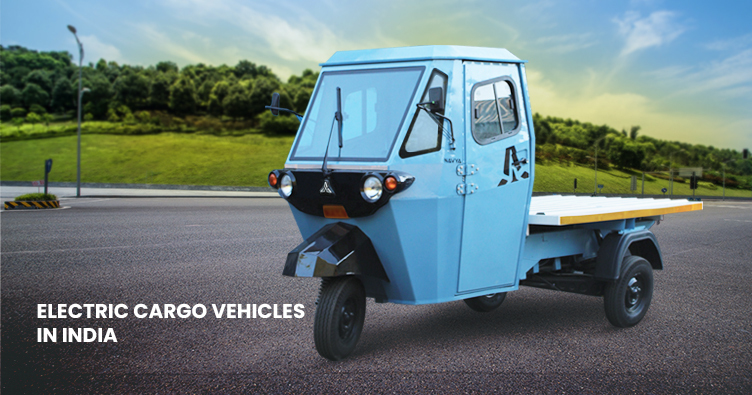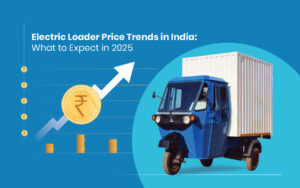Electric Cargo Vehicles: Driving Sustainable Logistics in India
As of late, there has been a developing spotlight on supportability and natural protection, especially in the transportation area. As a component of this worldwide shift towards cleaner and greener practices, electric cargo vehicles have emerged as a promising answer for tending to the difficulties of logistics in India. With the country’s fast industrialization and economic development, the interest in effective transportation of products has soared, prompting expanded carbon emissions and pollution.
Electric cargo vehicles in India
Electric cargo vehicles are causing disturbances in the transportation business in India as they offer a sustainable and eco-friendly option in contrast to traditional combustion engine vehicles. With the rising spotlight on decreasing carbon outflows and moderating the effect of environmental change, the adoption of electric cargo vehicles is viewed as a critical stage towards accomplishing a greener future for the logistics area in the country.
How Electric Cargo Vehicles Are Shaping the Future of Sustainable Logistics in India
The following benefits demonstrate how electric cargo vehicles will transform the future of logistics in India –
- Decreased Pollution – One of the significant benefits of electric cargo vehicles is their capacity to work with zero tailpipe outflows, which assists in diminishing pollution and further developing air quality in blocked metropolitan regions. This is vital in a nation like India, where significant urban communities are wrestling with the issue of disintegrating air quality because of vehicular emanations. By switching to electric cargo vehicles, logistics organizations can contribute towards establishing a cleaner and better climate for the populace.
- Cost-effectiveness – Notwithstanding their ecological benefits, electric cargo vehicles additionally offer cost-reserve funds to administrators over the long haul. While the upfront cost of buying an electric vehicle is higher than that of a traditional internal combustion engine vehicle, the operational and support costs are essentially lower. Electric vehicles have fewer moving parts and require less support, prompting investment funds for fixes and upkeep over the vehicle’s life expectancy. In addition, the cost of electricity is, for the most part, lower than that of fossil fuels , bringing about lower running costs for electric cargo vehicles.
- Eligibility for Incentives – The Government of India has additionally been proactive in advancing the adoption of electric vehicles, including cargo vehicles, through different incentives and endowments. The Faster Adoption and Manufacturing of Hybrid and Electric Vehicles (FAME) policy gives monetary incentives to purchasers of electric vehicles, making them more reasonable and alluring to customers. Likewise, state governments have additionally developed approaches to energize the utilization of electric vehicles, for example, deferring street assessment and offering sponsorships on enlistment expenses.
- Better Accessibility – One more key driver for the adoption of electric cargo vehicles in India is the push towards making a powerful charging framework the nation over. With headways in innovation, charging stations for electric vehicles are becoming more widespread, making it simpler for administrators to re-energise their vehicles in a hurry. The accessibility of quick charging stations decreases the margin time for electric cargo vehicles, empowering them to effectively cover longer distances and fulfill conveyance time constraints.
- Effortless Driving – Moreover, electric cargo vehicles offer a calmer and smoother driving experience compared with traditional combustion engine vehicles , prompting a decrease in air pollution especially in metropolitan regions. This is particularly beneficial for evening-time conveyances in local locations, where commotion from diesel trucks can upset occupants’ rest and personal satisfaction. Electric vehicles are a calmer option, guaranteeing a quiet climate for the two occupants and drivers.
Conclusion
In conclusion, electric cargo vehicles are set to change how logistics operations are done in India. With the rising emphasis on sustainable practices and the need to lessen carbon emissions, electric vehicles present a reasonable answer for transportation in the country.
The expected benefits of electric cargo vehicles are various. Besides the fact that they offer a cleaner and all-environmentally friendly option in contrast to traditional diesel-powered vehicles, they likewise provide cost-reserve funds over the long haul. As innovation advances and battery costs keep diminishing, the economics of switching to electric vehicles become increasingly viable .
Moreover, electric cargo vehicles can possibly change metropolitan logistics in India. With their calm operation and zero tailpipe emanations, they can assist with diminishing pollution and further developing air quality in urban areas. This is particularly significant in densely populated metropolitan regions where pollution levels are high and traffic is a significant issue.
The Indian government has previously done whatever it takes to advance the adoption of electric vehicles through different strategies and incentives. Drives like the Faster Adoption and Manufacturing of Hybrid and Electric Vehicles (FAME) policy and the Public Electric Mobility Mission Plan are pointed towards speeding up the shift towards electric vehicles in the country.
However, there are still moves that should be addressed to fully understand the capability of electric cargo vehicles in India. Issues like the absence of a satisfactory charging infrastructure , high upfront costs, and reach tension should be overcome for the far and wide adoption of electric vehicles.
A coordinated effort between the government, industry partners, and the conflicted area will be essential in tending to these difficulties and making a steady ecosystem for electric vehicles in India. By cooperating, we can create a sustainable future for logistics in the nation and prepare for a cleaner and greener transportation framework.
Electric cargo vehicles can possibly change the logistics business in India by diminishing outflows and working costs. With progress in innovation and expanded government support, these vehicles are becoming a suitable and sustainable choice for businesses. By embracing electric cargo vehicles, India can make ready for a greener future for its logistics area while likewise adding to worldwide endeavors to battle environmental change. We should endeavor towards a more sustainable and proficient transportation framework for a brighter future.




